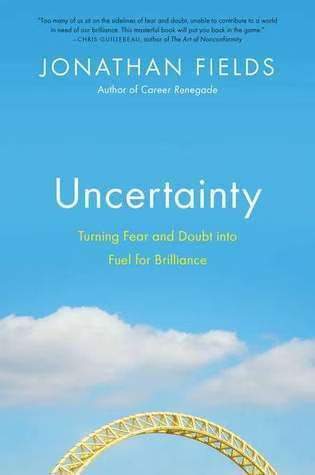Summary: Uncertainty

These book summaries are designed as captures for what I’ve read, and aren’t necessarily great standalone resources for those who have not read the book. Their purpose is to ensure that I capture what I learn from any given text, so as to avoid realizing years later that I have no idea what it was about or how I benefited from it.
Why uncertainty matters
If we want to create anything genuinely new, we must expose ourselves to uncertainty and its inevitable associates: risk of loss, and exposure to judgement
If we want to make things we need to learn how to deal with these things
What uncertainty does to us
Uncertainty causes pain in a number of forms
These are usually suffering, anxiety, and fear
This is our default state, hardwired into the brain
These end up paralyzing many people, keeping them from being able to create
The myth of the fearless creator
Not everyone is shut down by uncertainty, risk of loss, and fear of judgement
We hear stories of great creators who produce excellent things despite these obstacles
It turns out that these people aren’t freaks; they’ve just developed habits, and a system, that allows them to thrive despite (and maybe even because of) these things
It’s possible to learn these things
Some people actively build these systems to fight the problems; others do so naturally without realizing it
The concept here is Fear Alchemy, where we can use these dangerous environmental variables of risk of loss, fear of failure, and fear of judgement to drive our creation process
The idea is to turn these things into creative fuel
Certainty anchors
Certainty anchors are experiences that ground you and let you take risks more comfortably
These include things like rituals and routines, such as exercising every morning, doing meditation, always writing between certain hours, etc.
Build your hive
Another thing you must do is be able to handle judgement and criticism
Criticism isn’t just bad; it can help you grow
You want to have mentors, champions, and heroes
Socializing creation
Most creation is a tremendous burden on the creator
Using technology it’s now possible to outsource much of the process, as long as you’re willing to give up a degree of credit and value
Blend lean methodology or other feedback-driven technologies into your process you can rapid prototype release gather feedback, re-prototoype, and rerelease very quickly with smaller and smaller changes
This isn’t just for business ideas; you can do it with traditional art as well; many artists are doing just this
Train your brain
There are certain things you should do daily to maximize your creativity
Attentional Training (AT) is the art of training your brain in focused awareness, and includes things like meditation, relaxation, and movement
AT can dramatically improve your ability o create
Exercise is another dramatic improver of creativity
You should do both daily if you are a creator
See the forest
One of the biggest challenges is knowing when to pursue a project to the end days, vs. when you should abandon it
When are you giving up too soon vs. staying in long after you should have left?
You need to establish circuit breakers to make sure you don’t fall down the abyss
Control the worst-case-scenarios
Lay out and explore the actual worst-case scenarios
Listing them removes their power
Read my other book summaries >.
Notes
I was pleased with how well this book summarized its chapters at the end.